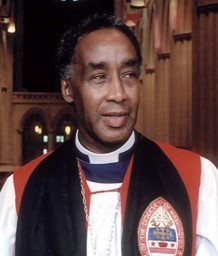John T. Walker (bishop) facts for kids
Quick facts for kids John Thomas Walker |
|
|---|---|
| Bishop of Washington | |
 |
|
| Church | Episcopal Church |
| Diocese | Washington |
| In Office | 1977–1989 |
| Predecessor | William Creighton |
| Successor | Ronald H. Haines |
| Other posts | Dean of Washington National Cathedral (1978-1989) |
| Orders | |
| Ordination | February 19, 1955 |
| Consecration | June 29, 1971 by John E. Hines |
| Personal details | |
| Born | July 27, 1925 Barnesville, Georgia, United States |
| Died | September 30, 1989 (aged 64) Washington, D.C., United States |
| Buried | Washington National Cathedral |
| Nationality | American |
| Denomination | Anglican |
| Parents | Joseph Walker & Mattie Wyche |
| Spouse | Rosa Maria Flores |
| Children | 3 |
| Previous post | Suffragan Bishop of Washington (1971-1976) Coadjutor Bishop of Washington (1976-1977) |
John Thomas Walker (born July 27, 1925 – died September 30, 1989) was an important leader in the Episcopal Church. He served as the Bishop of Washington from 1977 to 1989. He was also the Dean of the famous Washington National Cathedral during that time. Bishop Walker made history as the first African-American Bishop of Washington.
Contents
Who Was Bishop John T. Walker?
John Thomas Walker was a respected religious leader and a strong voice for fairness. He was known for his work to help others and for standing up against injustice. His life showed how one person can make a big difference in their community and the world.
Early Life and Education
John Thomas Walker was born in Barnesville, Georgia. He grew up in Detroit, a large city in Michigan. He was a very dedicated student. In 1951, he became the first African American student to be accepted into the Virginia Theological Seminary. This was a major step forward for equality. Later, he came to Washington, D.C., to work at the Washington National Cathedral.
A Leader for Change
Bishop Walker became well-known around the world for his efforts in social activism. This means he worked hard to bring about positive changes in society. He was a close friend of Archbishop Desmond Tutu, another famous leader who fought for justice.
Bishop Walker even got arrested once while protesting against apartheid at the South African Embassy. Apartheid was a system of unfair racial separation in South Africa. This shows how strongly he felt about equal rights for all people.
From 1975 until he passed away in 1989, Bishop Walker was the President of the Board of Directors for Africare. This organization helps people in Africa. Today, Africare gives out the Bishop John T. Walker Distinguished Humanitarian Service Award every year to honor his work.
His Lasting Legacy
Bishop John T. Walker's contributions continue to help people today. Several places and awards are named after him. They remember his important work and his dedication to education and helping others.
The Bishop John T. Walker School
In September 2008, The Bishop John T. Walker School opened in Southeast, Washington, D.C.. This school is tuition-free, meaning families do not have to pay for their children to attend. It serves boys from kindergarten through sixth grade. The school was started by the Episcopal Diocese of Washington. It helps African American boys in low-income areas get a good education.
The Learning Center
Another place named after him is the Bishop John T. Walker Learning Center in Washington, D.C.. Its goal is to support and encourage learning for everyone. It offers instruction, discussions, and ways for people to explore new ideas.
Later Life and Passing
Bishop Walker passed away suddenly on September 30, 1989. He was 64 years old. He died from heart failure after having surgery. He is buried at the Washington National Cathedral, a place where he served for many years.

